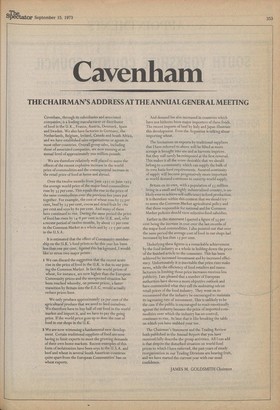Cavenham
THE CHAIRMAN'S ADDRESS AT THE ANNUAL GENERAL MEETING
Cavenham, through its subsidiaries and associated companies, is a leading manufacturer or distributor of food in the U.K., France, Austria, Denmark, Spain and Sweden. We also have factories in Germany, the Netherlands, Belgium, Ireland, Canada and South Africa, and we have established sales organisations or agents in most other countries. Overall group sales, including those of associated companies, are now running at an annual level of approximately 700 million pounds.
We are therefore relatively well placed to assess the effects of the recent explosive increase in the world price of commodities and the consequential increase in the retail price of food at home and abroad.
Over the twelve months from June 5972 to June 597 3 the average world price of the major food commodities rose by 3; per cent. This equals the rise in the price of the same commodities over the previous five years put together. For example, the cost of wheat rose by 7s per cent, beef by 2ç per cent, cocoa and dried fruit by i 8a per cent and soya by 80 per cent. And many of them have continued to rise. During the same period the price of food has risen by s48 per cent in the U.K. and; oer a recent period of twelve months, by about i 2 per cent in the Common Market as a whole and by 12.7 per cent in the U.S.A.
It is estimated that the effect of Community membership on the U.K. 's food prices so far this year has been less than one per cent. Against this background, I would like to stress two major points :
I We can discard the suggestion that the recent acute rise in the price of food in the U.K. is due to our joining the Common Market. In fact the world prices of wheat, for instance, are now higher than the European Community prices and the unexpected situation has been reached whereby, on present prices, a faster transition by Britain into the E.E.C. would actually reduce prices here.
We only produce approximately co per cent of the agricultural produce that we need to feed ourselves. We therefore have to buy half of our food in the world market and import it, and we have to pay the going price. If the world price, goes up so does the cost of food in our shops in the U.K.
2 We are now witnessing a fundamental new development. Certain traditional suppliers of food are now having to limit exports to meet the growing demands of their own home markets. Recent examples of this form of isolationism have been soya in the U.S.A. and beef and wheat in several South American countries quite apart from the European Communities' ban on wheat exports.
And demand has also increased in countries which have not hitherto been major importers of these foods. The recent imports of beef by Italy and Japan illustrate this development. Even the Argentine is talking about
importing wheat. r The limitations on exports by traditional suppliers that !have referred to above will be lifted as more acreage is brought into use and as harvests improve. But they will surely be reimposed at the first .reversal, This makes it all the more desirable that we should belong to a community which can supply the hulk of its own basic food requirements. Assured continuity of supply will become progressively more important as world demand continues to outstrip world supply.
Britain on its own, with a population of çç million living in a small and highly industrialised country, is unlikely ever to achieve self-sufficiency in food production. It is therefore within this context that we should try to assess the Common Market agricultural policy and that those responsible for national and for Common Market policies should view selective food subsidies.
Earlier in this statement I quoted a figure of 35 per cent being the increase in cost over the last months of the major food commodities. I also pointed out that over the same period the average cost of food in our shops had increased by less than s s per cent.
Underlying these figures is a remarkable achievement by the food industry as a whole in holding down the price of the finished article to the consumer. This has been achieved by increased investment and by increased efficiency. Unfortunately it is inevitable that price rises make news, while the efficiency of food retailers and manufacturers in limiting those price increases receives less publicity. I am pleased that a number of European authorities have shown a more objective outlook and have commended what they call the moderating role on retail prices of the food industry. They went on to recommend that the industry be encouraged to maintain its increasing rate of investment. This is unlikely to be the case lithe public is encouraged to react emotionally against the industry because the price of importe.d commodities over which the industry has no control, continues to rise. At best that is like breaking the table on which you have stubbed your toe.
The Chairman's Statement and the Trading Review both published in the Annual Report that you have received fully describe the group activities. All I can add is that despite the disturbed situation on world food prices to which I have referred, the past years of steady reorganization in our Trading Divisions are bearing fruit, and we have started the current year with our usual confidence.
JAMES M. GOLDSMITH Chairman
































 Previous page
Previous page